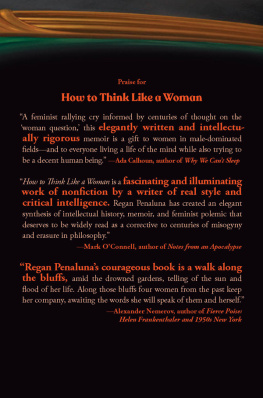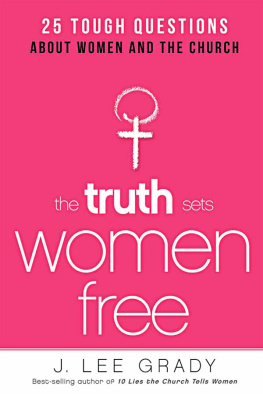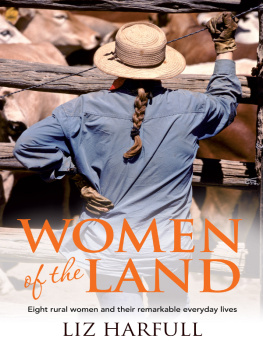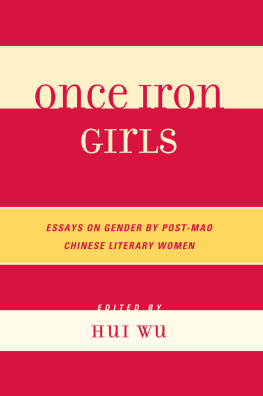This book has caused in me a kind of anguish even beyond the usual anguish I feel in publishing, due to worries about both its likely political and its personal effects on our discipline as well as on our lives. I leaned on many people for help. The authors included herein inspired me with their courage and taught me many things in our exchanges, things about philosophy, about life, and about the intersection of the two. Many other women in philosophy also gave me help, encouragement, and sound advice, including Vrinda Dalmiya, Iris Young, Lynne McFall, Linda Bell, and Peg Simons. At a moments notice, Libby Potter read through the introduction and helped me to think through issues of tone as well as substance. Eve DeVaro from Rowman & Littlefield was very supportive and helpful throughout. George Yancy, who has edited two recent books of autobiographical essays by philosophers, was also critically helpful in his encouragement and his concrete suggestions from the beginning.
Yancys volumes, one on African American philosophers and one that is a more general collection, provided a model for my own. (I am constrained from saying that his volumes are wonderful because I am in one of them, but they really are wonderful: quite well-done and very interesting.) But Sara Ruddicks collection Working It Out: 23 Women Writers, Artists, Scientists, and Scholars Talk about Their Lives and Work , which she edited with Pamela Daniels over twenty years ago, was the inspiration for the idea of this book. The themes that organized Saras book might be taken from the chapter on The Independent Woman in Simone de Beauvoirs Second Sex, that is, the challenges faced by women when we pursue intellectual work. These challenges include male-dominated styles of work and male-centered organizations of the workplace but also the obstacle that feminine socialization becomes when we pursue any individual, non-family-related project. I know from discussing that book with so many women that reading such personal, literary, and confessional (before that became a dirty word) stories written by such fascinating and successful women made us all feel less weird and crazy for having so many internal monologues of doubt, and then having monologues about our monologues! Working It Out gave us, as consciousness-raising at its best had done, a political context for our difficulties but without the abstractions of structural analysis or the objective distancing of social psychology. Besides inspiring the current book, Sara was enormously generous in lending her help with many aspects of the editing process over several months. I am deeply in her debt.
About the Contributors
Linda Martin Alcoff is Professor of Philosophy, Political Science, and Womens Studies at Syracuse University. Her books include Feminist Epistemologies, coedited with Elizabeth Potter (1993); Real Knowing: New Versions of the Coherence Theory (1996); Epistemology: The Big Questions (1998); Thinking from the Underside of History, coedited with Eduardo Mendieta (2000); and Identities: Race, Class, Gender, and Nationality, coedited with Eduardo Mendieta (2003). The title of her forthcoming book is Visible Identities: Race, Gender, and the Self. She has written over sixty articles on topics concerning epistemology, sexual violence, the politics of knowledge, and gender and race identity.
Sandra Lee Bartky is Professor of Philosophy and Gender and Womens Studies at the University of Illinois, Chicago. Her interests include feminist theory, critical theory, critical race studies, phenomenology, Marxism, and psychoanalysis. She is a founder of the Society for Women in Philosophy, now an international network. Her publications include Femininity and Domination: Studies in the Phenomenology of Oppression (1991) and Sympathy and Solidarity and Other Essays (2002).
Teresa Brennan was the Schmidt Distinguished Professor of Humanities at Florida Atlantic University, where she was a founder of the innovative Ph.D. program in comparative studies for public intellectuals. A social philosopher with a doctorate from Cambridge University, she was a visiting professor at Harvard, Brandeis, and Cornell universities, the New School of Social Research, and the universities of London and Melbourne, among other institutions. She also served as an invited philosopher to the United Nations World Health Organizations working group on genetic engineering and to UN pre-summit meetings on development. Her books include History after Lacan (1993); The Interpretation of the Flesh: Freuds Theory of Femininity (1992); Exhausting Modernity: Grounds for a New Economy (2000); and Globalization and Its Terrors (2003). Her book Transmission of Affect will be published posthumously.
Claudia Card is Emma Goldman Professor of Philosophy at the University of Wisconsin, with teaching affiliations in Jewish Studies, Environmental Studies, and Womens Studies. She is the author of The Atrocity Paradigm: A Theory of Evil (2002); The Unnatural Lottery: Character and Moral Luck (1996); and Lesbian Choices (1995). She is also editor of The Cambridge Companion to Simone de Beauvoir (2003), On Feminist Ethics and Politics (1999), Adventures in Lesbian Philosophy (1994), and Feminist Ethics (1991). She is currently a senior member at the Institute for Research in the Humanities (Madison, Wisconsin), where she is at work on two books, one on responding to atrocities, the other an introduction to feminist philosophy.
Virginia Held is Distinguished Professor of Philosophy at the City University of New York. She was president of the Eastern Division of the American Philosophical Association for 20012002. Among her books are The Public Interest and Individual Interests (1970); Rights and Goods: Justifying Social Action (1984); Feminist Morality: Transforming Culture, Society, and Politics (1993); the edited collections Property, Profits, and Economic Justice (1980); Justice and Care: Essential Readings in Feminist Ethics (1995); and the coedited collections Philosophy and Political Action (1972); and Philosophy, Morality, and International Affairs (1974). She has been a fellow at the Center for Advanced Study in the Behavioral Sciences, and she has also had Fulbright and Rockefeller fellowships. She has been on the editorial boards of many journals in the areas of philosophy and political theory and has had visiting appointments at Yale, Dartmouth, UCLA, and Hamilton. She is currently working on the topics of group responsibility, terrorism, and the ethics of care.
Alison M. Jaggar is Professor of Philosophy and Womens Studies at the University of Colorado, Boulder. She teaches classes in moral and political philosophy with an emphasis on feminism, feminist methodology, feminist practical ethics, and values and social policy. Jaggars books include Feminist Frameworks, edited with Paula Rothenberg (1978); Feminist Politics and Human Nature (1983); Gender/Body/Knowledge: Feminist Reconstructions of Being and Knowing, edited with Susan R. Bordo (1989); Living with Contradictions: Controversies in Feminist Social Ethics (1994); Morality and Social Justice, authored with James P. Sterba and others (1995); A Companion to Feminist Philosophy, ( Blackwell ), edited with Iris M. Young (1998). Professor Jaggar has received numerous grants and fellowships, including a Rockefeller Foundation Fellowship and two fellowships from the National Endowment for the Humanities. Currently, she is working on a book on feminist discourse ethics, tentatively entitled, Sex, Truth, and Power: A Feminist Theory of Moral Reason. She is also interested in the issues raised for moral and political theory by the integration of the global economy.










